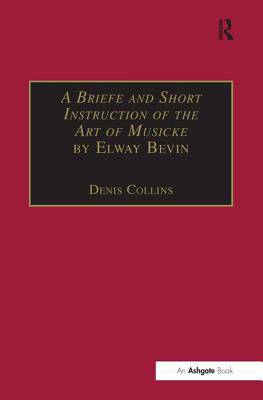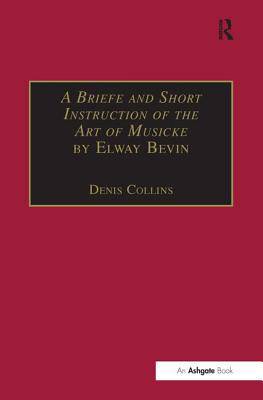
Door een staking bij bpost kan je online bestelling op dit moment iets langer onderweg zijn dan voorzien. Dringend iets nodig? Onze winkels ontvangen jou met open armen!
- Afhalen na 1 uur in een winkel met voorraad
- Gratis thuislevering in België vanaf € 30
- Ruim aanbod met 7 miljoen producten
Door een staking bij bpost kan je online bestelling op dit moment iets langer onderweg zijn dan voorzien. Dringend iets nodig? Onze winkels ontvangen jou met open armen!
- Afhalen na 1 uur in een winkel met voorraad
- Gratis thuislevering in België vanaf € 30
- Ruim aanbod met 7 miljoen producten
Zoeken
A Briefe and Short Instruction of the Art of Musicke by Elway Bevin
€ 195,95
+ 391 punten
Omschrijving
Elway Bevin's A Briefe and Short Instruction of the Art of Musicke begins with rudimentary instruction on consonance, dissonance and proportions but quickly turns to a presentation of examples of plainsong-based canonic writing of increasing complexity and remarkable diversity. Bevin's book was well known in the seventeenth and eighteenth centuries and was quoted or commented upon by Christopher Simpson, Henry Purcell, Charles Burney, John Hawkins and Augustus Kollmann. In the introduction to this modern edition of the work, the first edition to appear since the original was published in 1631, Denis Collins establishes the great importance of A Briefe and Short Instruction of the Art of Musicke in the history of canon. He assesses Bevin's relationship to English theories of canon and to manuscript collections of plainsong canons from the late sixteenth and early seventeenth centuries, and he proposes a typology for canonic processes and structures which is applied in the discussion of Bevin's canons.
Specificaties
Betrokkenen
- Uitgeverij:
Inhoud
- Aantal bladzijden:
- 152
- Taal:
- Engels
- Reeks:
Eigenschappen
- Productcode (EAN):
- 9780754650539
- Verschijningsdatum:
- 28/08/2007
- Uitvoering:
- Hardcover
- Formaat:
- Genaaid
- Afmetingen:
- 156 mm x 233 mm
- Gewicht:
- 339 g

Alleen bij Standaard Boekhandel
+ 391 punten op je klantenkaart van Standaard Boekhandel
Beoordelingen
We publiceren alleen reviews die voldoen aan de voorwaarden voor reviews. Bekijk onze voorwaarden voor reviews.










